What Are Considered the Best Undergrad Programs for Chemistry Majors?
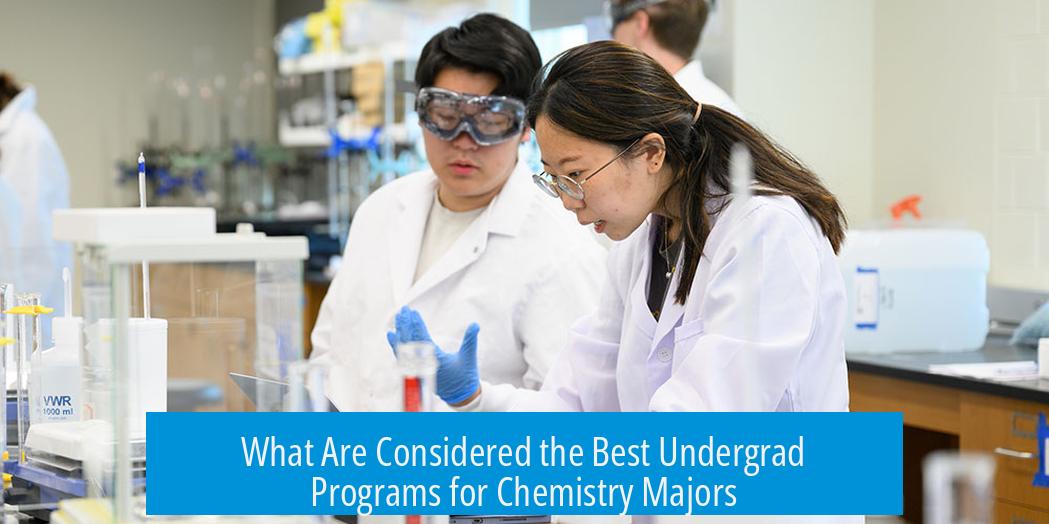
The best undergraduate programs for chemistry majors are typically found at elite institutions known for their breadth and depth of research, such as Harvard, MIT, Caltech, Stanford, and Berkeley. However, personal drive, specific research opportunities, and fit with the institution often carry equal or greater weight than the school’s overall prestige.
Leading Institutions with Strong Chemistry Programs
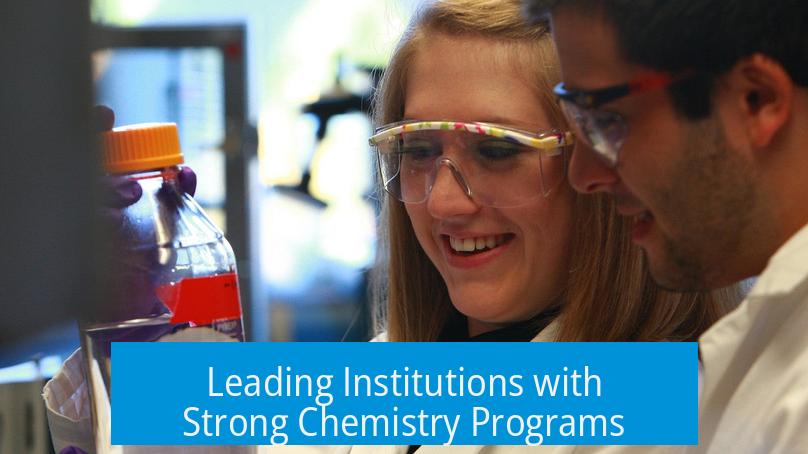
Top-tier schools like Harvard, MIT, Caltech, Stanford, and Berkeley stand out due to their extensive chemistry research options. These universities boast multiple cutting-edge labs that allow students to explore a wide range of subfields within chemistry. The depth and variety of research projects at these schools often surpass what is available elsewhere, providing students with unparalleled experiences.
For example:
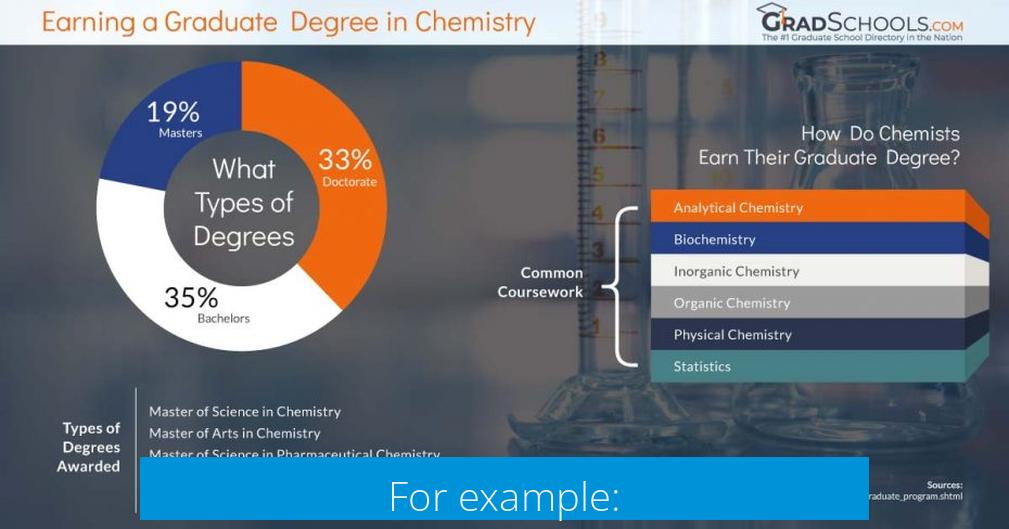
- MIT offers state-of-the-art facilities for physical, organic, and inorganic chemistry.
- Caltech’s focus on interdisciplinary research allows chemistry students to collaborate with physics and biology.
- Stanford’s proximity to Silicon Valley fosters innovative research and industry connections.
Research Labs and Mentorship: The Real Game Changers
While the school’s overall reputation matters, the single most crucial factor is the research lab a student joins. Quality of mentorship and lab environment profoundly influence a student’s development and future prospects. A well-connected and funded lab can offer better hands-on experience, more publications, and stronger recommendations.
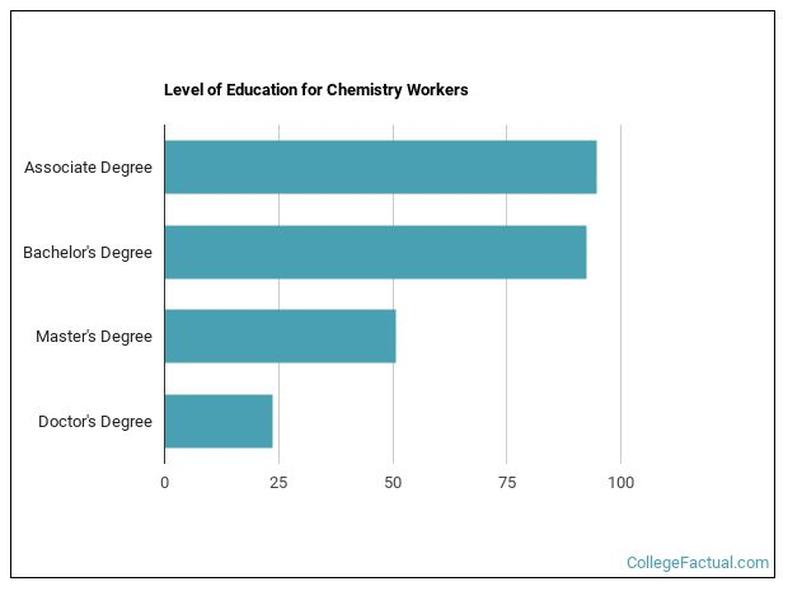
For many students, gaining access to a particular professor’s lab may outweigh attending a more prestigious institution without that opportunity. In essence, the lab environment can be a gateway to top graduate programs and career advancement.
Personal Drive Trumps Institutional Prestige
Personal motivation to learn and engage with chemistry matters far more than the school’s name. Students at mid-range state universities can attain a Harvard or Caltech level of education if they work hard and seek resources proactively. Conversely, simply coasting at an elite school may not provide any distinct advantage.
This highlights the importance of a student’s initiative and willingness to pursue extra research projects, internships, and learning experiences. Excellence is shaped more by individual effort than by institutional prestige alone.
Under-the-Radar and Primarily Undergraduate Institutions (PUIs)
Many strong chemistry programs exist at lesser-known primarily undergraduate institutions. Places like St. Olaf College in Minnesota offer effective chemistry education with close faculty mentoring. These institutions may not appear on typical rankings but provide personalized instruction and research opportunities.
PUIs excel in small class sizes and hands-on experiences. They may lack the extensive research infrastructure of larger universities but offer a supportive environment tailored to undergraduate chemistry education.
Advantages of Graduating from Elite Schools
Graduates from top-tier schools sometimes receive tangible benefits in graduate school. For instance, students from Caltech may qualify for course waivers, reflecting the advanced preparation they have received. These advantages can reduce graduate coursework burdens and streamline time to degree completion.
Such benefits are not universal but can enhance students’ graduate experiences by acknowledging their rigorous undergraduate training.
Matching the Institution with Personal Fit
Choosing the best undergraduate program involves assessing fit beyond rankings. A school that matches a student’s learning style, social needs, and career goals can foster greater academic success.
While Harvard and similar schools offer undeniable advantages, one should consider whether the campus environment allows for optimal work performance. Students thrive best where they feel supported and motivated.
Sleeper Programs with Influential Faculty
Some mid-tier or lower-ranked schools host standout professors with large research programs. Associating with these well-connected faculty can open doors to prestigious graduate schools.
In such cases, the strength of a single professor’s lab and network can outweigh the broader school prestige. Students benefit from personalized mentorship and research projects tied to notable specialists in their area of interest.
Key Takeaways
- Elite schools like Harvard, MIT, Caltech, Stanford, and Berkeley offer broad, deep chemistry research options.
- Research lab quality and mentorship have greater impact on success than overall school brand.
- Personal drive can offset attending less prestigious institutions.
- PUIs and lesser-known colleges may provide strong chemistry education with close faculty interaction.
- Graduates of top schools sometimes receive graduate school advantages like course waivers.
- Choosing a school that fits personal needs and style is crucial.
- Sleeper programs with influential faculty can deliver excellent research opportunities.
What Are Considered the Best Undergrad Programs for Chemistry Majors?
Simply put: The best undergrad programs for chemistry majors are often found at elite institutions like Harvard, MIT, Caltech, Stanford, and Berkeley due to their extensive research options and depth. However, the reality is more nuanced; personal drive and the specific lab you join often matter more than the fancy name on your diploma.
Now, let’s unpack this with some flair and facts.
If you’ve ever googled “best chemistry undergraduate programs,” you probably stumbled across the usual suspects: Harvard, MIT, Caltech, Stanford, Berkeley. These schools are like the Avengers of chemistry: assembling the best minds, cutting-edge labs, and a furious pace of innovation. But here is the kicker — not every chemistry major at these schools automatically hits the jackpot. It really comes down to which lab you land in.
In fact, one of the biggest insiders’ tips is this: the individual lab experience eclipses even the school’s reputation. You might attend a top-tier school, but if you do your undergrad research in a mediocre lab without active mentorship, it won’t set your career on fire. Conversely, a goldmine of opportunities can be found in less glamorous schools if you snap up a spot in a powerhouse research group led by a well-connected professor.
This brings up a fascinating point: what truly propels you forward in chemistry? Your personal drive and initiative. Think of it this way — a student at a mid-tier state school who hunts down opportunities, asks questions, seeks research, and genuinely cooks up a storm in the lab can receive an education on par with a classmate at Harvard or Caltech who just cruises by. Being proactive replaces brand names with real substance. So, don’t obsess over rankings alone.
Top-Tier Schools: They’re Not Just Eye Candy
Let’s be real. If you get into one of those elite universities—it does come with benefits. Take Caltech, for example. Graduating from there once earned a student exemption from the grueling quantum chemistry course in grad school. That’s a tangible edge nobody scoffs at. These schools house multiple labs where groundbreaking work happens simultaneously, offering an array of choices. So, if you’re the curious type who wants to explore various fields from organic to physical to materials chemistry, these places deliver variety few others can match.
Who’s the Hidden Gem? PUIs and Sleeper Programs
But what if you’re not headed to a big city university with Ivy League halos? Enter the “sleeper” programs or primarily undergraduate institutions (PUIs) like St. Olaf College in Minnesota. Despite flying under the radar, they offer solid, hands-on chemistry training with the bonus of personalized mentorship. You won’t find the instant prestige, but you might get more face-time with faculty passionately invested in your success. Sometimes this personal attention beats the hustle and bustle of giant schools where undergraduates compete for scraps of lab time.
Don’t underestimate the power of one influential professor at a mid-sized or lower-ranked institution, either. These professors often hold the keys to excellent research projects and can propel you into top graduate programs. Getting recruited by a well-known faculty member in a “lower tier” school can be just as, if not more, beneficial than a generic degree from a “better” institution.
What Should You Really Care About?
Here’s the million-dollar question: How do you pick? The answer isn’t a simple “go to the highest-ranked school” or “join the best-known lab.” It’s about personal fit. Are you the kind of student who thrives in fast-paced research-heavy environments? Do you prefer close-knit communities where professors know your name? Some students would sacrifice a shiny prestige sticker for a place where they do their best work and feel comfortable. As one chemistry major said, “Harvard? Sure, it’s worth it. But below a certain level, it’s about your own undergrad life, your work ethic, and environment.”
Some Quick Tips for Aspiring Chemistry Majors
- Research the labs, not just the school. Find labs doing work that excites you and reach out early.
- Look for faculty with connections to renowned grad programs and a good track record of mentoring undergrads.
- Consider PUIs if you value mentorship and smaller classes; some can be hidden jewels worth your time.
- Remember, your drive to learn is the secret ingredient. Even the best school won’t push you if you don’t push yourself.
- Evaluate your personal comfort with the campus culture and environment. Prestige doesn’t replace happiness or motivation.
So, does the best undergraduate chemistry program exist only in places with marble halls and famous names? Nope. It’s wherever your passion meets opportunity. And that means choosing labs that spark your curiosity, schools that match your vibe, and most importantly, bringing your own relentless curiosity and hustle to the table.
After all, in the world of chemistry, success boils down to the right mix—of institution, lab, and *you* as the ultimate catalyst.
What makes schools like Harvard, MIT, and Caltech top choices for chemistry undergrads?
These schools offer a wide range of research opportunities across many labs. The depth and variety of labs give students a chance to work on cutting-edge projects not found elsewhere.
How important is the specific lab a student joins compared to the school’s reputation?
The quality of the lab and mentorship there are more important. A strong lab placement can open doors for graduate school and career success, sometimes more than the school’s name.
Can students at less prestigious schools get the same chemistry education as those at elite institutions?
Yes. Personal drive and seeking out learning opportunities are key. With enough effort, a student at a state school can achieve knowledge comparable to one at a top-tier university.
Are there good chemistry programs outside of well-known universities?
Yes, many primarily undergraduate institutions (PUIs) have strong chemistry departments. For example, St. Olaf College offers solid chemistry education despite less national recognition.
Do elite schools offer any tangible advantages after graduation?
Graduating from a top school like Caltech can provide benefits like course exemptions in graduate school. This can ease the academic transition and show preparedness for advanced studies.
How should students decide on a chemistry program if not just by rankings?
- Consider where you can do your best work.
- Look for mentorship opportunities.
- Think about campus culture and personal fit.
- Rankings matter, but so does the environment you’ll thrive in.


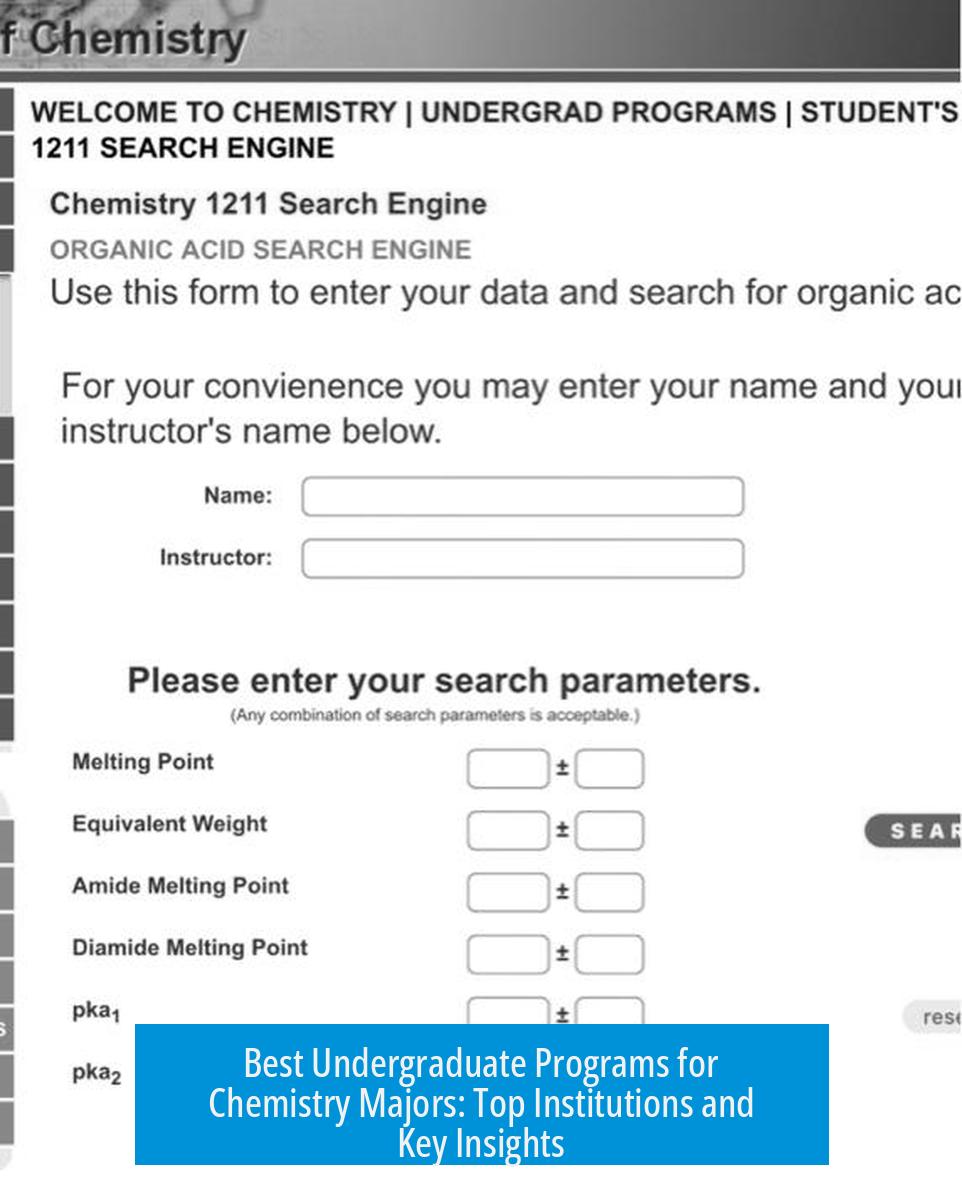
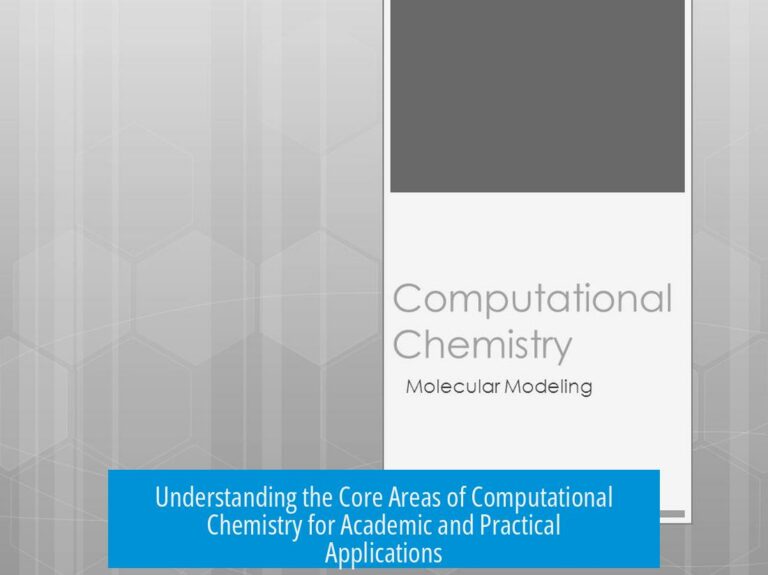
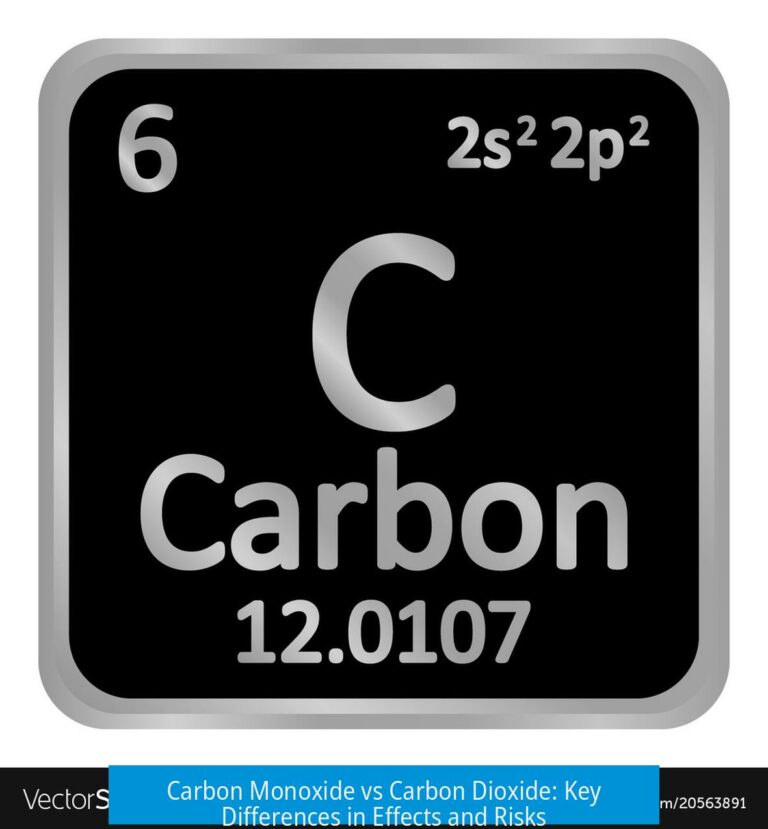
Leave a Comment